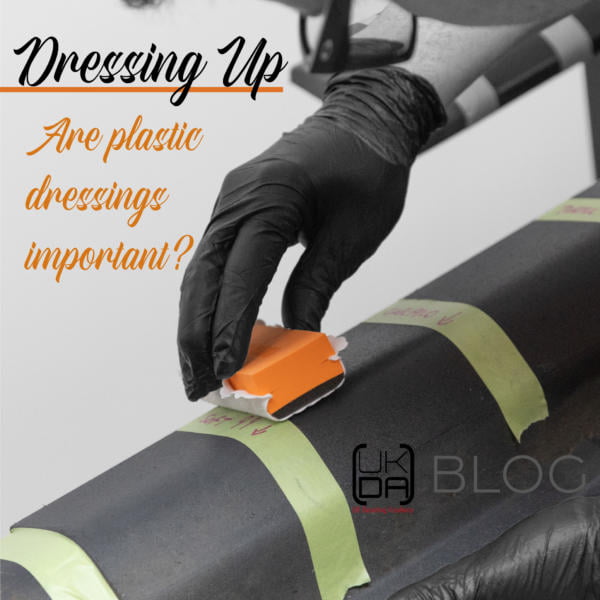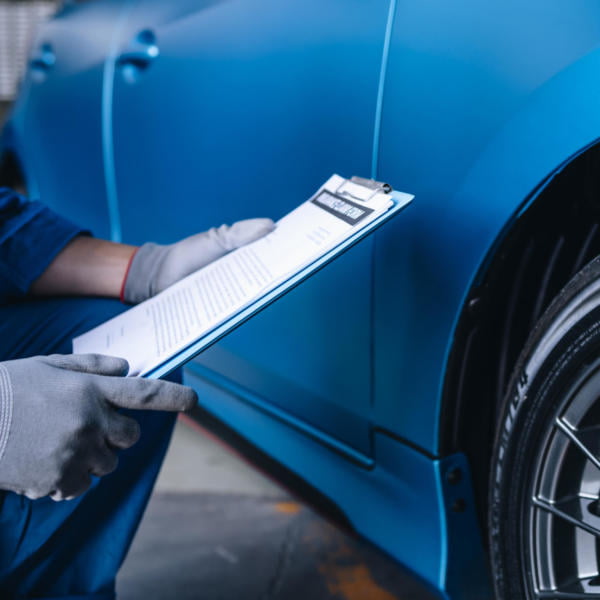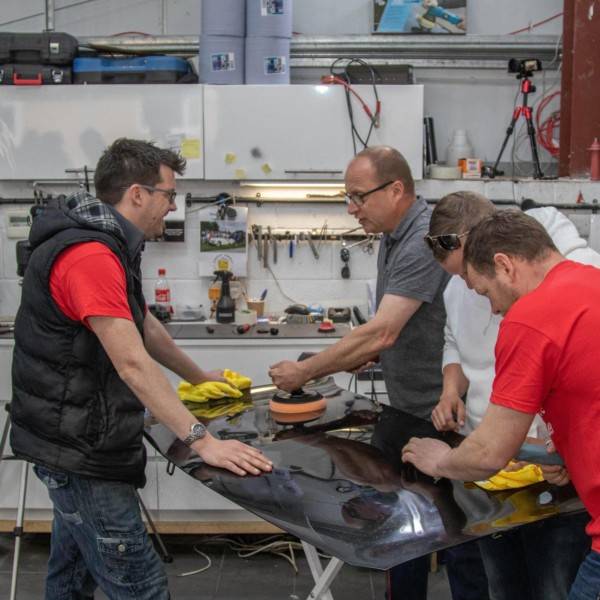
We get this question all the time, and see it on the social networks almost daily. As a professional, product choice is an entirely different process than for a home enthusiast, so we thought it would be a good idea to go through what you need to think about when making it.
VOLUME SAVINGS
As a hobbyist, it is fun to try new things and you’re probably only working on a car two or three times a month, so there is little point in buying 25 litres of shampoo and having it clog up the garage. Conversely, as a professional, you’re looking for value and that normally comes with bulk products. This immediately rules out a vast array of boutique brands that are offering their wares in cute little 250ml bottles with fancy labels and a free packet of Haribo. That’s not to say you should dismiss them entirely, if you find something you like there is no harm in asking if you can get it in 25 litres.
Whether you are mobile or unit-based, it makes sense to work out how much of each product genre you use on a monthly basis, and then calculate an efficient volume to buy at. The savings on product cost are normally huge, but also you make savings on postage and time spent in front of a computer making orders, added to which there is less admin reconciling all your orders.
It is worth investing in shelving and taps so you can decant from 25-litre kegs into smaller bottles, and we’d recommend buying high-quality 750ml bottles with chemical-resistant dual-action trigger sprays or quality flip-top caps to go with them. You can then label the bottles yourself and they can look very smart all lined up on a shelf or on racks in your van – just remember to ensure the CLP (Classification, Labelling, & Packaging) information is on your labels, just in case someone else uses them, like an employee.
%22%20transform%3D%22translate(.6%20.6)%20scale(1.16797)%22%20fill-opacity%3D%22.5%22%3E%3Cpath%20fill%3D%22%230c0a1c%22%20d%3D%22M-16.5%20206.4l181-96.3%2054%20101.5-181%2096.3z%22%2F%3E%3Cellipse%20fill%3D%22%23a3a4a0%22%20cx%3D%2270%22%20cy%3D%2270%22%20rx%3D%22229%22%20ry%3D%2249%22%2F%3E%3Cellipse%20fill%3D%22%23c1c1c1%22%20cx%3D%2269%22%20cy%3D%2261%22%20rx%3D%2236%22%20ry%3D%2236%22%2F%3E%3Cellipse%20fill%3D%22%23352b6a%22%20cx%3D%22213%22%20cy%3D%22201%22%20rx%3D%2251%22%20ry%3D%2251%22%2F%3E%3Cellipse%20fill%3D%22%230b0d02%22%20cx%3D%2299%22%20cy%3D%22227%22%20rx%3D%2252%22%20ry%3D%2252%22%2F%3E%3Cellipse%20fill%3D%22%234c4d48%22%20cx%3D%22151%22%20cy%3D%22126%22%20rx%3D%2240%22%20ry%3D%2249%22%2F%3E%3Cellipse%20fill%3D%22%23393a37%22%20rx%3D%221%22%20ry%3D%221%22%20transform%3D%22matrix(-2.97289%2027.98939%20-49.75215%20-5.28442%20237.2%2026.1)%22%2F%3E%3Cellipse%20fill%3D%22%23a4a4a2%22%20rx%3D%221%22%20ry%3D%221%22%20transform%3D%22rotate(-97.1%20162.8%20-52.3)%20scale(27.61251%2041.95653)%22%2F%3E%3Cellipse%20fill%3D%22%23363a1e%22%20rx%3D%221%22%20ry%3D%221%22%20transform%3D%22matrix(32.91926%20.0831%20-.10947%2043.36506%20249%20205.3)%22%2F%3E%3Cellipse%20fill%3D%22%23453693%22%20cx%3D%22192%22%20cy%3D%22196%22%20rx%3D%2227%22%20ry%3D%2243%22%2F%3E%3Cellipse%20fill%3D%22%23939391%22%20rx%3D%221%22%20ry%3D%221%22%20transform%3D%22matrix(2.23977%20-22.81904%2036.16133%203.54937%2080.5%2021.3)%22%2F%3E%3Cellipse%20fill%3D%22%23949592%22%20rx%3D%221%22%20ry%3D%221%22%20transform%3D%22matrix(33.33048%20-11.08365%205.33575%2016.04553%2015%20129.5)%22%2F%3E%3Cellipse%20fill%3D%22%234a4a49%22%20rx%3D%221%22%20ry%3D%221%22%20transform%3D%22matrix(-12.40212%20-9.71125%2020.03325%20-25.58422%200%2042.7)%22%2F%3E%3Cellipse%20fill%3D%22%235a5a58%22%20rx%3D%221%22%20ry%3D%221%22%20transform%3D%22matrix(9.18908%2016.19843%20-59.91053%2033.98619%20105.3%20128.6)%22%2F%3E%3Cellipse%20fill%3D%22%23d7d7d7%22%20cx%3D%2264%22%20cy%3D%2258%22%20rx%3D%2211%22%20ry%3D%2211%22%2F%3E%3Cellipse%20fill%3D%22%23494a41%22%20rx%3D%221%22%20ry%3D%221%22%20transform%3D%22matrix(10.66223%2015.45578%20-101.1805%2069.79976%207.7%20212.7)%22%2F%3E%3Cellipse%20fill%3D%22%23333332%22%20rx%3D%221%22%20ry%3D%221%22%20transform%3D%22matrix(-18.0922%2017.15906%20-24.90107%20-26.25524%20235%202.6)%22%2F%3E%3C%2Fg%3E%3C%2Fsvg%3E) CONCENTRATION MATTERS
CONCENTRATION MATTERS
Related to volume, the concentration of products is also important to consider. Typical car shampoos you might find on the high street usually have a concentration of 1:200, but some specialist products can be 1:2000 and cost about the same per litre – providing literally 10x the value. For products such as APC, clay lube, quick detailer, etc., buying in concentrate has other advantages – cheaper postage, less storage space required, and you can vary the concentration depending on what you need. In fact, when it comes to cleaning products, you would be amazed how many products are pretty much the same thing but in different concentrations.
It’s well worth getting your own empty bottles with graduations embossed on the side so you can accurately measure your concentrations and use the correct amount of product – too weak and it won’t do the job; too strong and not only are you over-spending on the product, but you also risk damaging the vehicle you’re working on.
BUY ONLY WHAT YOU NEED
In the olden days you had a pre-wash, a shampoo, a wax, and a compound perhaps… now the catalogues of online resellers have swollen to at least twenty different genres of products, bolstered partly by marketing people deciding they can sell the same product with three different labels that bill them as ‘specialised’ for a particular purpose. A home enthusiast may appreciate the opportunity to grow their collection, but for the professional, focus on what you actually need! An APC, used in varying concentrations, is such a flexible product, that there’s no need to buy it five times over with different labels.
MANUFACTURER SUPPORT%22%20transform%3D%22translate(.8%20.8)%20scale(1.60547)%22%20fill-opacity%3D%22.5%22%3E%3Cellipse%20fill%3D%22%23b1b3b2%22%20cx%3D%22234%22%20cy%3D%2218%22%20rx%3D%2281%22%20ry%3D%2281%22%2F%3E%3Cellipse%20fill%3D%22%23292b2a%22%20rx%3D%221%22%20ry%3D%221%22%20transform%3D%22rotate(56.5%20-114%2086.3)%20scale(66.23726%20139.11321)%22%2F%3E%3Cellipse%20fill%3D%22%238d8f8e%22%20rx%3D%221%22%20ry%3D%221%22%20transform%3D%22matrix(73.45064%2017.90534%20-9.41645%2038.62783%20118%20186.2)%22%2F%3E%3Cellipse%20fill%3D%22%23232524%22%20rx%3D%221%22%20ry%3D%221%22%20transform%3D%22matrix(40.63398%2046.47161%20-27.8764%2024.37464%20248.9%20185.1)%22%2F%3E%3Cellipse%20fill%3D%22%23af6e84%22%20cx%3D%2254%22%20cy%3D%226%22%20rx%3D%2258%22%20ry%3D%2215%22%2F%3E%3Cellipse%20fill%3D%22%23b7b7b7%22%20cx%3D%22255%22%20cy%3D%2221%22%20rx%3D%2242%22%20ry%3D%2242%22%2F%3E%3Cellipse%20fill%3D%22%23181918%22%20rx%3D%221%22%20ry%3D%221%22%20transform%3D%22matrix(-23.62217%2018.9228%20-13.96807%20-17.43696%200%2060.7)%22%2F%3E%3Cellipse%20rx%3D%221%22%20ry%3D%221%22%20transform%3D%22matrix(13.00935%20-1.87282%204.4596%2030.9781%207.4%20199.7)%22%2F%3E%3Cpath%20fill%3D%22%23535353%22%20d%3D%22M135%20141L32%20127v102z%22%2F%3E%3Cellipse%20fill%3D%22%237f5966%22%20rx%3D%221%22%20ry%3D%221%22%20transform%3D%22rotate(-53.4%2063%20-60.4)%20scale(35.77016%2029.73198)%22%2F%3E%3Cellipse%20fill%3D%22%23767676%22%20rx%3D%221%22%20ry%3D%221%22%20transform%3D%22rotate(-120.1%20112.1%20-29)%20scale(60.19984%2031.36557)%22%2F%3E%3Cellipse%20fill%3D%22%23888%22%20rx%3D%221%22%20ry%3D%221%22%20transform%3D%22rotate(137.7%2029%20121)%20scale(46.67633%2039.01161)%22%2F%3E%3Cpath%20fill%3D%22%237d968d%22%20d%3D%22M-15.8-9.9l72.4%209-2.8%2022.8-72.4-9z%22%2F%3E%3Cellipse%20fill%3D%22%239a3758%22%20cx%3D%2285%22%20rx%3D%2224%22%20ry%3D%2229%22%2F%3E%3Cpath%20fill%3D%22%233b3b3b%22%20d%3D%22M17%2060h128v59H17z%22%2F%3E%3Cpath%20fill%3D%22%23696969%22%20d%3D%22M37.7%20133.5l-7.7.3-.5%2025%2072.7%206.1z%22%2F%3E%3Cellipse%20fill%3D%22%23363636%22%20cx%3D%2232%22%20cy%3D%22188%22%20rx%3D%2213%22%20ry%3D%2234%22%2F%3E%3C%2Fg%3E%3C%2Fsvg%3E)
While your top priorities when choosing a product as a professional will usually revolve around value and effectiveness, there are other ancillary benefits that may well tip the balance between two well-matched manufacturers.
Suppliers with buzzing social media who actively like and share your social media posts can really help get your company exposure, while in the case of some higher-end brands, you can offer services specifically using their products and attract premium clientele.
As a professional you ideally need to have the Safety Data Sheets (SDS) for all the products you use, but some manufacturers make it easier than others to source them. Going with a supplier that openly hosts all the SDS on their website for easy access is always a good sign, while some may be able to provide extra labels for you to use on your own bottles when you buy in bulk.
Technical support is another important thing to consider when picking a brand – is there someone on the end of the phone who can help you? Now and then we may come across something new or a bit different, and it always pays to double-check product compatibility before lathering your customer’s vehicle in a product that might do more harm than good. Top examples are anodized finishes, polished aluminium, and carbon ceramic brakes – get it wrong and your insurance company will be getting a call.
MANUFACTURER VS REBOTTLER
While we are on the topic of manufacturers, it is usually sensible to make sure your supplier actually is a manufacturer. With so many re-bottled and white-labelled products out there, you risk buying from further down the supply chain than you really need to. There are plenty of companies that use a third-party chemical manufacturer to produce a specific formulation on their behalf – and there is nothing wrong with this, as long as it is a unique product to which the company has developed and owns the rights. However, there are plenty of brands out there whose only unique IP are the labels printed on the bottles and the colour/aroma added – you’re much better off going to whoever makes or has developed the liquid inside!
HOW MANY BRANDS? %22%20transform%3D%22translate(.7%20.7)%20scale(1.42578)%22%20fill-opacity%3D%22.5%22%3E%3Cellipse%20fill%3D%22%23969696%22%20rx%3D%221%22%20ry%3D%221%22%20transform%3D%22matrix(-18.32627%2090.88818%20-64.48212%20-13.00188%20130.6%20124.9)%22%2F%3E%3Cellipse%20rx%3D%221%22%20ry%3D%221%22%20transform%3D%22matrix(-29.43853%20-31.09818%20160.25756%20-151.70493%2031%2033.3)%22%2F%3E%3Cellipse%20rx%3D%221%22%20ry%3D%221%22%20transform%3D%22rotate(157.9%20116.7%2051.2)%20scale(42.70724%20255.00001)%22%2F%3E%3Cpath%20d%3D%22M22.4%20100.7l1.2%2070-40%20.6-1.2-70z%22%2F%3E%3Cellipse%20fill%3D%22%23909090%22%20rx%3D%221%22%20ry%3D%221%22%20transform%3D%22matrix(-32.5183%20-4.976%207.89523%20-51.59555%20141.1%2098.5)%22%2F%3E%3Cellipse%20fill%3D%22%23696969%22%20cx%3D%22192%22%20cy%3D%22144%22%20rx%3D%2227%22%20ry%3D%2237%22%2F%3E%3Cellipse%20fill%3D%22%231c1c1c%22%20cx%3D%22141%22%20cy%3D%225%22%20rx%3D%22255%22%20ry%3D%2212%22%2F%3E%3Cellipse%20fill%3D%22%23555%22%20rx%3D%221%22%20ry%3D%221%22%20transform%3D%22matrix(15.39192%209.11257%20-34.176%2057.72625%2083.3%2098)%22%2F%3E%3Cellipse%20fill%3D%22%23535353%22%20cx%3D%22126%22%20cy%3D%22161%22%20rx%3D%2273%22%20ry%3D%2216%22%2F%3E%3Cellipse%20fill%3D%22%23474747%22%20cx%3D%22190%22%20cy%3D%2275%22%20rx%3D%2217%22%20ry%3D%2242%22%2F%3E%3Cellipse%20fill%3D%22%23898989%22%20rx%3D%221%22%20ry%3D%221%22%20transform%3D%22matrix(10.97117%2017.86233%20-15.73957%209.66736%20107.8%20125.1)%22%2F%3E%3Cpath%20fill%3D%22%230c0c0c%22%20d%3D%22M235%20145h13v24h-13z%22%2F%3E%3Cpath%20fill%3D%22%235f5f5f%22%20d%3D%22M161%2022l-49%2014%2079%2021z%22%2F%3E%3Cellipse%20fill%3D%22%23444%22%20rx%3D%221%22%20ry%3D%221%22%20transform%3D%22matrix(-10.1913%203.15584%20-7.28295%20-23.51917%20224%20122)%22%2F%3E%3Cellipse%20fill%3D%22%23616161%22%20rx%3D%221%22%20ry%3D%221%22%20transform%3D%22matrix(16.86242%20-2.3125%207.24588%2052.83576%2073.6%20145.2)%22%2F%3E%3Cellipse%20fill%3D%22%23888%22%20cx%3D%22162%22%20cy%3D%22128%22%20rx%3D%2218%22%20ry%3D%2218%22%2F%3E%3Cellipse%20fill%3D%22%23626262%22%20rx%3D%221%22%20ry%3D%221%22%20transform%3D%22matrix(4.04631%2046.88108%20-17.07616%201.47385%20195.7%20148.7)%22%2F%3E%3C%2Fg%3E%3C%2Fsvg%3E)
Manufacturers may well produce every genre of product you need, but not every one of their products might be the most suitable for your requirements – so it makes sense to pick and chose products from a number of manufacturers. However, if you use a different manufacturer for every product you use, not only does it take an age to make two dozen separate orders, but you’re also unlikely to make the minimum order quantities (MOQs) to qualify for good discounts. It’s all a matter of balance – too few suppliers and you become vulnerable to price rises, supply disruption, or product discontinuation; too many different suppliers and you’ll spend more time ordering bottles than washing cars. Generally speaking, professionals will have one or two brands they use for maintenance products, one or two brands for LSPs/coatings, and then a couple more for specific products they like.
SUPPLY CHAIN

Finally, consider your supply chain. Many manufacturers, particularly smaller ones, will sell to you directly via a trade account. With no intermediaries, there is more margin for them, and more potential discount for you, plus you may well get direct access to their technical expertise.
However, if you use a broad range of different brands, you may save time by going to one of the large, multi-brand resellers. Many of these offer technical support, trade accounts, and even promotional assistance. Quite a few of the big resellers are also distributors, so they sell to other resellers who then sell to the end user – you. If you can find out who distributes the products you want, then you might well be able to go direct and negotiate bigger discounts compared to buying further down the supply chain.
A final important element to consider for your supply chain is reliability. With Brexit and Covid affecting both the availability of foreign-made products and the supply of raw ingredients used by UK manufacturers, it makes sense to find out how much stock resellers generally hold and where manufacturers are based.
At UKDA we have plenty of expertise and connections within the industry at large to help you make product choices. Our links with the PRO Detailer Magazine, The International Detailing Association, and the PVD Trade Association give us unique access to a vast range of products, while we are regularly contacted by OEMs to test and evaluate products on their behalf – if you have any questions, we’re always happy to help!
 CONCENTRATION MATTERS
CONCENTRATION MATTERS




